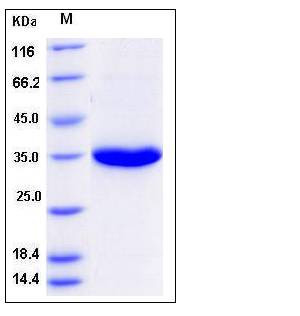Human KLK3 / PSA / Kallikrein-3 Protein (His Tag)
APS,Hk3,KLK2A1,PSA
- 100ug (NPP1638) Please inquiry
| Catalog Number | P10771-H08H |
|---|---|
| Organism Species | Human |
| Host | Human Cells |
| Synonyms | APS,Hk3,KLK2A1,PSA |
| Molecular Weight | The recombinant human KLK3 consists of 255 amino acids and has a predicted molecular mass of 28.3 kDa. In SDS-PAGE under reducing conditions, the apparent molecular mass of rh KLK3 is approximately 35 kDa. |
| predicted N | Ala 18 |
| SDS-PAGE |  |
| Purity | > 95 % as determined by SDS-PAGE |
| Protein Construction | A DNA sequence encoding the human KLK3 (P07288) (Met 1-Pro 261) was fused with a polyhistidine tag at the C-terminus. |
| Bio-activity | Measured by its ability to cleave the colorimetric peptide substrate, Succinyl-Arg-Pro-Tyr-p-Nitroanilide(Suc-RPY-pNA). The specific activity is >100 pmoles/min/μg. (Activation description: The proenzyme needs to be activated by Thermolysin for an activated form) |
| Research Area | Cancer |Cancer immunology |Tumor-associated antigen |
| Formulation | Lyophilized from sterile PBS, pH 7.4 1. Normally 5 % - 8 % trehalose, mannitol and 0.01% Tween80 are added as protectants before lyophilization. Specific concentrations are included in the hardcopy of COA. |
| Background | KLK3(Kallikrein 3), also known as Prostate Specific Antigen (PSA), kallikrein-related peptidase 3, Gamma-seminoprotein, is a secreted protein of the glandular kallikrein subfamily of serine proteases.KLK3 contains one peptidase S1 domain.KLK3 is a glycoprotein produced almost exclusively by the prostate gland. Growing evidence suggests that many kallikreins are implicated in carcinogenesis and some have potential as novel cancer and other disease biomarkers. |
| Reference |
